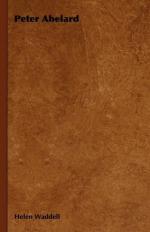|
This section contains 3,619 words (approx. 13 pages at 300 words per page) |

|
Peter Abelard has been famous since the fourteenth century for his exchange of love letters with Héloïse, his former wife, written when he was a monk and she a nun. Nineteenth-century historians saw him as a rationalist critic of traditional Christian doctrine and a forerunner of modernity. More recently, Abelard's originality and power as a philosopher have come to be appreciated.
Abelard's working life splits into two main, slightly overlapping periods. From about 1100 until about 1125, his activity as a thinker and teacher revolved around the ancient logical texts available in Latin at that time—the so-called logica vetus ("Old Logic"). But from about 1120, Abelard started to become strongly interested in questions about Christian doctrine, to which he gradually came to give an increasingly ethical emphasis. The important works of the first phase of his career were thus the Dialectica (c. 1113–1116), a logical...
|
This section contains 3,619 words (approx. 13 pages at 300 words per page) |

|


